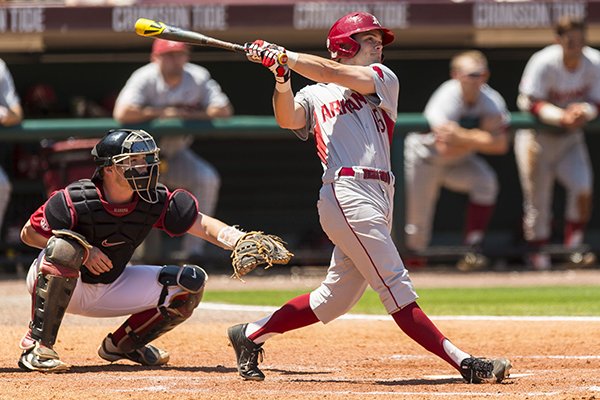FAYETTEVILLE — It's easy to see a difference in Andrew Benintendi this season.
The stats tell the story. Arkansas' starting center fielder is attempting to become the first player since Rafael Palmeiro to win the SEC triple crown with a .386 batting average, 15 home runs and 46 RBIs.
In a game that finds value in statistics more than any other, Benintendi is one of college baseball's most valuable players. He leads the nation in home runs, has stolen 20 bases and has reached base safely in 20 consecutive games.
He's one of 30 players on the watch list for the Golden Spikes Award, the Heisman Trophy of sorts for college baseball. It's an astonishing turnaround for a player who hit .276 with one home run and 27 RBIs a year ago.
"I couldn't have projected he'd hit 15 home runs; I thought he'd hit eight to 10," Arkansas coach Dave Van Horn said. "He's got a good swing and when everything is working and you make contact right, things just jump."
What changed? You name it.
First, Benintendi changed his body. He elected to not play summer baseball last year, instead focusing on the weight room, helping him gain about 15 pounds of mostly muscle.
Then there was a change in equipment. A flatter seam baseball has contributed to the offensive surge, not only for Benintendi, but across college baseball, where home runs have increased about 40 percent since last season.
But perhaps the biggest change for Benintendi has been his approach at the plate. A more open batting stance last season yielded disappointing results for the player named the nation's best coming out of high school.
Van Horn and batting coach Tony Vitello talked to him about changing his stance throughout last season, but it wasn't until pitching coach Dave Jorn mentioned something did a switch finally click.
“When you are a freshman in this league, you are facing some pretty good stuff," Jorn said. "What I saw was a lot of motion in his stance and his swing. He was open and striding, and diving at the ball. There were a lot of pitches that were just eating him up.
"My job is to watch hitters and get them out. You watch what they are doing. I could see what they were doing to him and I tried to help him."
Benintendi made the switch during the Razorbacks' series against LSU in Baton Rouge last April. He didn't record a hit the first game, but had four hits and a walk in his final seven at-bats of the series.
He added three more hits the next weekend in a series win over eventual national champion Vanderbilt. He raised his batting average 13 points over the final eight weeks of the season, an uncommon trend during the portion of the season when batters tend to wear down.
With a less defined leg kick and ability to generate more power from his upper and lower body, Benintendi hasn't slowed down since, battering opposing pitchers on just about any mistake over the plate. Last Sunday, Alabama pitcher Geoffrey Bramblett left two pitches in Benintendi's wheelhouse. The left-hander sent one into the opposite field for an RBI single and pulled the other one into the opposing bullpen for a solo home run.
"To me, his approach is good because he goes the other way," Van Horn said. "For a while pitchers wouldn't throw him in. Alabama decided they were going to throw him in and got him out a little bit early, but then it didn't work the last couple of times.
"He's adjusted with the pitches and taken what they've given him. The thing I like is he's taking his walks (34 this year). If you take walks, you'll hit for (good) average. That's what has advanced him as a hitter."
That kind of versatility has made Benintendi one of the toughest outs in the SEC. Unlike many with his kind of home run numbers, he can do more than just crush a pitch left over the plate.
His home run at Alabama was his first in more than three weeks. During the interim he went through one stretch in which he reached base in 15 of 16 plate appearances, including nine straight times to close out a series upset of then-No. 1 Texas A&M in College Station.
He'll turn 21 in July, making him eligible for the MLB Draft as a sophomore. He is expected to be one of the top college bats on draft boards.
That means that unless the No. 20 Razorbacks host an NCAA regional next month, this weekend's series against Tennessee will almost assuredly be his last at Baum Stadium - one last chance for the home crowd to see one of the better swings to come through Fayetteville.
“It didn't take much with someone like Andrew because he's a good baseball guy and has good understanding," Jorn said. "He's real good. He won't be here next year.”

